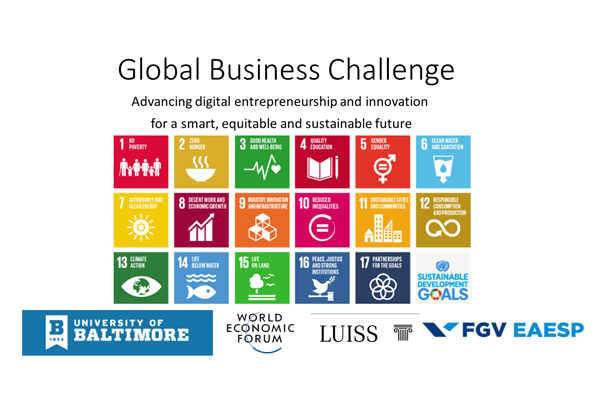Global Business Challenge Prevails Despite Pandemic
When the worldwide pandemic struck, it temporarily halted the Merrick School of Business’ Global Field Study program. For the Parsons Professor of Digital Innovations and Thompson Chair in Management Information Systems, Eusebio Scornavacca, a year without his Global Business Challenge course, wasn’t going to be acceptable, so he jumped into action to plan a virtual experience for our students.
He began by tapping into his global network of contacts to generate partnerships for the Global Business Challenge. Like all of the Global Business Challenges courses he offers, the important components include global university partners, companies with real problems for our students to solve, and energetic and motivated UBalt students. This formula once again came together in January 2021 and bridged ten times zones and four continents, students from three business schools, and special a guest from the World Economic Forum, and of course seven companies from around the globe who had real-life challenges to solve.
The Global Business Challenge’s goal is to advance digital entrepreneurship and innovation that generate positive socioeconomic and environmental impact across the planet. During the weeklong intensive course, the corporate partners prepared challenges for our students and the students from LUISS in Rome, Italy and Brazil’s Fundação Getulio Vargas’s Sao Paulo School of Business Administration, that focus on some immediate needs. The student teams were advised by Scornavacca and professors Lilian Carvalho (FGV) and Fabian Homberg (LUISS). The challenge included corporate partners:
- CoGo, a New Zealand/UK company tech company focused on sustainable consumption and carbon tracker with a challenge to expand in new markets
- Dynamhex, an American energy consumption data company who’s CEO, Sanwar Sunny, is also a Merrick School of Business assistant professor of entrepreneurship in the Merrick School of Business and had the challenge to create a market strategy for partnership development across the United States.
- Firgun, Brazilian fintech company for low income entrepreneurs with a challenge to create new and alternative ways to assess credit.
- com, an Italian company that eco-friendly bus charters seeking assistance in developing a go-to-market strategy for a new service.
- Vetrya, an Italian company that develops digital services, applications, and broadband solutions with a challenge on how to adapt to the new normal of the work-from-home environment.
- The Greenery, a Netherlands-based company that provides a complete range of vegetables, fruit and mushrooms to supermarket chains in Europe, North America and the Far East throughout the year who asked students to evaluate the impact of attaining PlanetProof certification.
- Blockforce, a Brazilian blockchain company focused on social impact with a challenge to export their services globally.
“The Global Business Challenge enables a unique immersive experience for students from interdisciplinary backgrounds,” said Scornavacca. “The multinational teams apply their skills and collaborate in a cross-cultural environment, to solve real-world business challenges of innovative start-ups. They are helping our partners to create a smart, equitable, and sustainable future – directly contributing to the UN Sustainable Development Goals.”
Julia Cole, a current MBA student and entrepreneur in her own right, participated in the challenge that CoGo into the U.S. market.
“The Virtual Global Business Challenge taught me a lot about teamwork in a virtual, dynamic environment,” Cole said in a message to Scornavacca. “It was valuable to work with colleagues in different locations and from diverse cultures. I enjoyed getting to know them on professional and personal levels. I believe this experience exceeded my expectations, and I hope that I will be able to take part in a similar project as an alumna.”
One of the outstanding opportunities afforded to the group was profound words shared by Stephan Mergenthaler, head of strategic intelligence at World Economic Forum. His keynote on “Building Strategic Intelligence” inspired the teams to make a positive contribution towards addressing the economic, environmental, social and technological challenges of our complex, interdependent world.
Murray Dalziel, dean of the Merrick School of Business believes that the outcomes are meaningful for all the parties involved.
“This is a great program. I always look forward to seeing the outcomes of the Global Business Challenge. As someone who spent a good part of their career working with cross-national teams, I always felt these were some of the most fulfilling engagements—often stretching and always learning. I hope our gained a broader perspective of the world and enjoyed the experience.”

